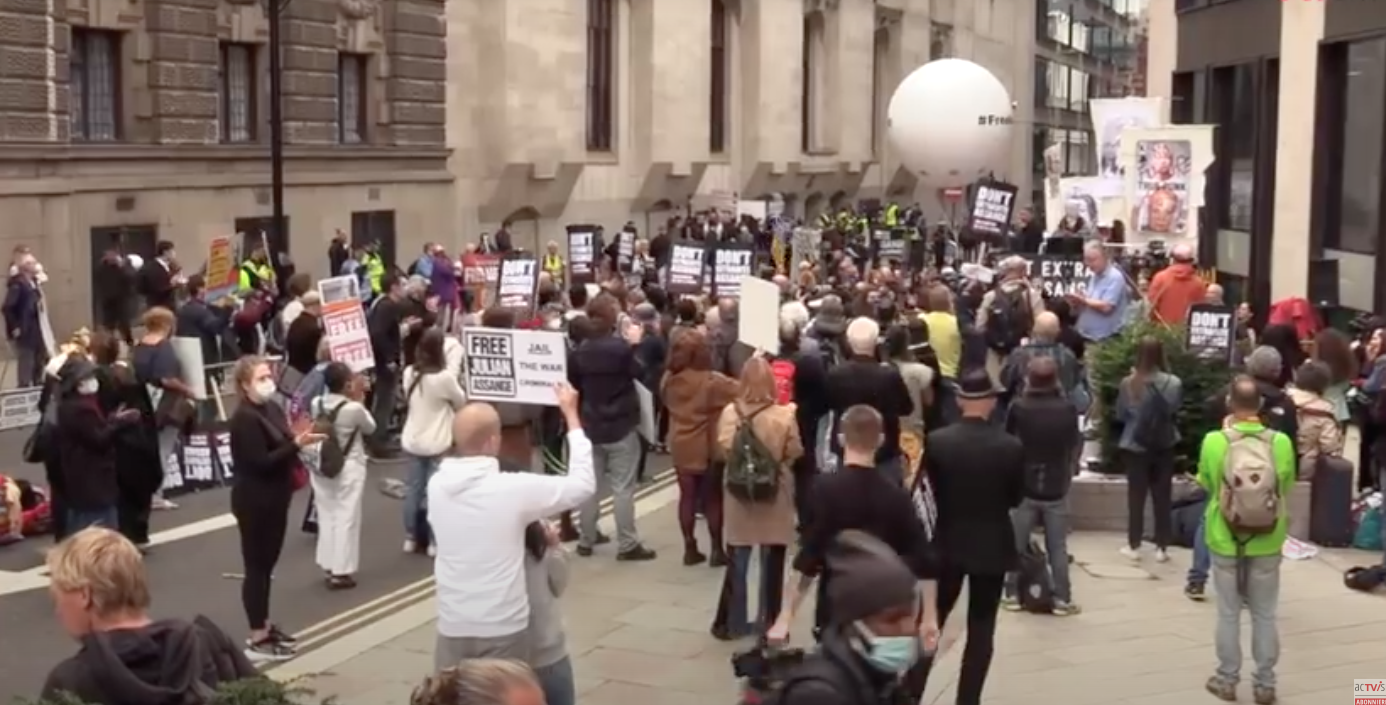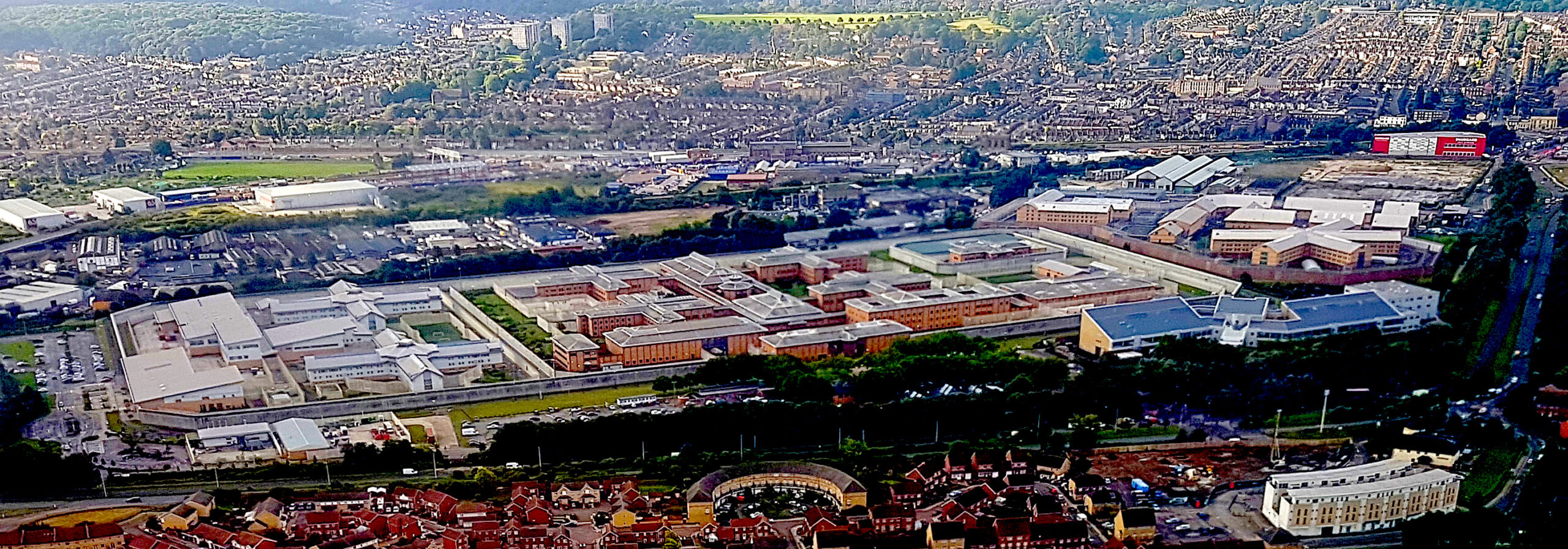On the eve of a demonstration outside the paper’s office in London, Jonathan Cook issues a statement about The Guardian’s abandonment of its former media partner.

Assange supporters outside the Old Bailey courthouse in London at the start of the extradition trial of Julian Assange. (You Tube, AcTivism Munich still)
By Jonathan Cook
Jonathan-Cook.net
 WISE Up, a solidarity group for Julian Assange and whistleblower Chelsea Manning, is due to stage a demonstration outside The Guardian offices on Oct. 22 to protest the paper’s failure to support Assange as the U.S. seeks his extradition in an unprecedented assault on press freedom.
WISE Up, a solidarity group for Julian Assange and whistleblower Chelsea Manning, is due to stage a demonstration outside The Guardian offices on Oct. 22 to protest the paper’s failure to support Assange as the U.S. seeks his extradition in an unprecedented assault on press freedom.
The date chosen for the protest marks the 10th anniversary of The Guardian’s publication of the Iraq war logs, leaked by Manning to Assange and which lie at the heart of the U.S. case to reclassify journalism exposing crimes against humanity as “espionage.”
Here is my full statement, part of which is due to be read out, in support of Assange and castigating The Guardian for its craven failure to speak up in solidarity with its former media partner:
Julian Assange has been hounded out of public life and public view by the U.K. and U.S. governments for the best part of a decade.
Now he languishes in a small, airless cell in Belmarsh high-security prison in London — a victim of arbitrary detention, according to a UN working group, and a victim of psychological torture, according to Nils Melzer, the UN’s expert on torture.
If Judge Vanessa Baraitser, presiding in the Central Criminal Court in London, agrees to extradition, as she gives every appearance of preparing to do, Assange will be the first journalist to face a terrifying new ordeal — a form of extraordinary rendition to the United States for “espionage” — for having the courage to publish documents that exposed U.S. war crimes and crimes against humanity.
The Guardian worked with Assange and WikiLeaks on vitally important documents – now at the heart of the U.S. case against Assange – known as the Afghanistan and Iraq war logs. The latter were published exactly a decade ago today. They were a journalistic coup of global significance, and the paper ought to be profoundly proud of its role in bringing them to public attention.
Protest Call Out! Thursday 22/10/20 at 12 noon The Guardian’s Role in the Persecution and Prosecution of Julian #Assange https://t.co/OJhq1ElaLW
— Emmy Butlin (@greekemmy) October 20, 2020
During Assange’s extradition hearing, however, The Guardian treated the logs and its past association with Assange and WikiLeaks more like a dirty secret it hoped to keep out of sight. Those scoops furnished by Assange and whistleblower Chelsea Manning enriched the paper financially, and bolstered its standing internationally. They also helped to pave its path into the lucrative U.S. market.
Unlike Assange and Manning, The Guardian has suffered no consequences for publishing the logs. Unlike Assange and Manning, the paper has faced no retribution. While it profited, Assange continues to be made an example of — to deter other journalists from contemplating following in his footsteps.
The Guardian owes Assange.
- It owes him a huge debt for allowing it to share in the journalistic glory of WikiLeaks’ revelations.
- It owes him a duty of care as its partner in publishing the logs.
- It owes him its voice loudly denouncing the abuse of a fellow journalist for doing the essence of journalism — holding the powerful to account.
- It owes him and its own staff, and the young journalists who will one day take their place, its muscle in vigorously defending the principle of a strong and free press.
- It owes him, and the rest of us, a clear profession of its outrage as the U.S. conducts an unprecedented assault on free speech, the foundation of a democratic society.
And yet The Guardian has barely raised its voice above a whisper as the noose has tightened around Assange’s — and by extension, our — neck. It has barely bothered to cover the dramatic and deeply disturbing developments of last month’s extradition hearing, or the blatant abuses of legal process overseen by Baraitser.
The Guardian has failed to raise its editorial voice in condemnation either of the patently dishonest U.S. case for extradition or of the undisguised mistreatment of Assange by Britain’s legal and judicial authorities.

Aerial view of HM Prison Belmarsh. (Kleon3, CC BY-SA 4.0, Wikimedia Commons)
The paper’s many columnists ignored the proceedings too, except for those who contributed yet more snide and personal attacks of the kind that have typified The Guardian’s coverage of Assange for many years.
It is not too late for the paper to act in defence of Assange and journalism.
Assange’s rights are being trampled under foot close by The Guardian’s offices in London because the British establishment knows that these abuses are taking place effectively in darkness. It has nothing to fear as long as the media abdicates its responsibility to scrutinize what amounts to the biggest attack on journalism in living memory.
Were The Guardian to shine a light on Assange’s case — as it is morally obligated to do — the pressure would build on other media organizations, not least the BBC, to do their job properly too. The British establishment would finally face a countervailing pressure to the one being exerted so forcefully by the U.S.
The Guardian should have stood up for Assange long ago, when the threats he and investigative journalism faced became unmistakable. It missed that opportunity. But the threats to Assange — and the causes of transparency and accountability he champions — have not gone away. They have only intensified. Assange needs the Guardian’s support more urgently, more desperately than ever before.
Jonathan Cook is a former Guardian journalist (1994-2001) and winner of the Martha Gellhorn Special Prize for Journalism. He is a freelance journalist based in Nazareth. If you appreciate his articles, please consider offering your financial support.
This article is from his blog Jonathan Cook.net.
The views expressed are solely those of the author and may or may not reflect those of Consortium News.
Please Contribute to Consortium News
Donate securely with
Click on ‘Return to PayPal’ here.
Or securely by credit card or check by clicking the red button:



The contrast between the eloquence of those speaking out on Julian Assange’s behalf and the craven silence of the news media especially the Guardian is alarming to witness. The Guardian of what?
Excellent commentary by Jonathan Cook, I wholeheartedly agree with all points.
Thank you very much for all the good reporting on this case!
I agree with Alex Cox.
I especially appreciate the panel discussions on CN Live
Leonard Cohen on Julian Assange:
“Now the courtroom is quiet, but who will confess
Is it true you betrayed us? The answer is “yes”
Then read me the list of the crimes that are mine
I will ask for the mercy that you love to decline
And all the ladies go moist, and the judge has no choice
A singer must die for the lie in his voice
And I thank you, I thank you for doing your duty
You keepers of truth, you guardians of beauty
Your vision is right, my vision is wrong
I’m sorry for smudging the air with my song.”
THE GUARDIAN is a disgrace and has been for a long time.
In the context of the Guardians silence on the arbitrary detention and mistreatment of Assange in Belmarsh High Security Prison it is instructive to note that the Guardian Newspaper did not report the publication on 6th October 2020 of ‘The Independent Panel of Inquiry into the circumstances of the H Block & Armagh Prison Protests 1976-1981’, on the 6th October 2020. The Panel unhesitatingly concluded that the inhuman conditions in which prisoners were held were calculated to cause intense physical and mental suffering with the intention of humiliating and debasing prisoners and breaking their physical and moral resistance. It was the consequence of a purposeful policy implemented by the UK Government whose institutions were fully aware that their policies and practices violated international human rights standards and breached common law and statute.
It appears little has changed in respect of the vindictive and illegal actions of the UK State whose policy has been to treat Assange and Wikileaks as a major threat to the UK/US National Security Establishments. This policy has been systematically pursued by the UK prison and judicial authorities in their efforts to humiliate and render him incapable of résistance. The Guardians role in this process has been to undermine and damage the ‘Campaign to Free Julian Assange and in all likelihood cannot be forgiven as long as it remains a propaganda outlet for the National Security State.
hXXps://web.archive.org/web/20110925132344/http://nigelparry.com/news/guardian-david-leigh-cablegate.shtml
Check out this article from 2011 and decide for yourself why The Guardian became the spearhead in the Assange smear campaign.
The recent September Extradition Hearing outlined exactly the timeline of events and the heavy responsibility David Leigh and Luke Harding bear for the ensuing events by publishing the password to the unredacted files. But worse, instead of admitting the mistake they then indulged in demolishing Assange’s reputation for the next ten years. Mistake? Naivity? Shame? Personal grievance? or ….. ???